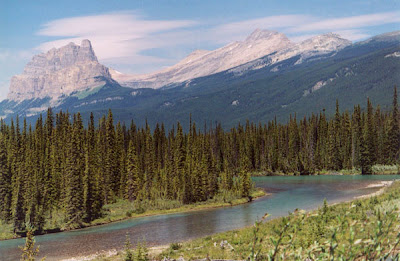
George Simpson:
The prarie had perhaps been selected by our correspondent as his post office from its being the place, at which the only two routes, by which we could have crossed the height of Land in this part of the country, happened to converge. The emigrants having been trecherously deserted, at Bow Biver, by their Guide, a half brees of some education [James SInclair] providemtially met an indian of the name of Bras Croche, who, being better aquainted with the mountains than Peechee[the Guide who took Simpson over the moutains], carried them through a little to the southward by a pass infinitely superior to ours; and the fell upon our track again near our present encampment.

Simpson, George. A Narrative of a Journey Around the World: During the Years 1841 and 1842. 2 vols. Philidelphia: Lea and Blanchard, 1847. Pg 81-82.
John Flett:
Crossing the South branch we entered the timber, sometimes following an Indian trail and sometimes with no trail made. On the second day after we entered the mountains James BIRD, our guide, bidding adieu to his friends and relatives, started on his return. Sir George SIMPSON’s assertion that he deserted us is a mistake. On the 5th of August we reached the summit, and found ourselves on a small plateau. Here we saw a huge snow-drift (August 5th) whose melted waters formed three little rills; one running east through a deep canyon, and finding its way through the Saskatchewan into Hudson’s bay; another running southeast into the Missouri, and
 at last in the gulf, while the third sent its waters through those continuous woods where rolls the Oregon.
at last in the gulf, while the third sent its waters through those continuous woods where rolls the Oregon.Flett, John. "Interesting Local History: A Sketch of the Emigration from Selkirk's Settlement to Puget Sound in 1841." Tacoma Daily Ledger, February 1885.
James Sinclair, BC Archives

No comments:
Post a Comment